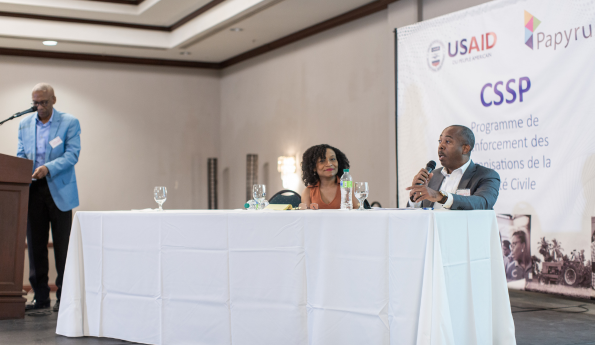© David Snyder/Counterpart International
This first-person account is part of a regular series of how Counterpart works in the field. This story is by Jennifer Brookland. Watch the video here.
The road to Jacquesil, a small fishing town on the edge of Haiti’s northern coast, seems greener than the choked roads of the city we’ve just left. As we approach Caracol Bay, piles of empty conch shells are pink-white evidence of a one-time bountiful harvest from these waters.
That kind of harvest is just a memory now. Degraded mangroves—cut down for fuel and income—are less able to provide protective habitat for fish to hatch and grow.
Overfishing and destructive techniques mean catches that in a regulated environment would be deemed too small and thrown back in for a shot a reproducing are instead kept and sold.
The two women who greet us on the shore, Maudeline and Guereline, are trying to organize the women of Jacquesil to protect Caracol Bay and the environment.
They’ve seen the changes over the past few years and want to get their community to understand that without healthy mangroves, there cannot be healthy fish either.
They are hoping Counterpart’s partner organization in Haiti, FoProBim, can help them find alternatives to cutting down the mangroves for fuel and income. They’re trying to offer computer and sewing classes instead.
But life is hard here on Haiti’s northern coast, for women and men who must take whatever they can get to earn a few gourdes each day.
As we chug briskly through the water, we see something splashing around up ahead. From a distance, it looks like men drowning.
It is a group of young Haitians out fishing, trying to make a living one of the only ways available to them.
Snorkel masks on, they splash and slap the water to scare fish toward the net, continuing their flapping as their friends on board a wooden boat begin gathering up the fabric.
They heave together, laughing and teasing in a way no crew coach would tolerate. The full extent of the net becomes clear as they gather more and more of it into their boat.
It is huge—fifty square feet maybe—its tiny hand-sewn squares able to catch fish that would hardly make a meal for a kitten.
But once the net is finally hauled aboard and the squid and poisonous puffer fish discarded back into the bay, there is only a shallow layer of twisting life at the bottom.
The fish are mournfully small. A few centimeters at best. As the fishermen run their hands through the pile they fall away like slippery pocket change, their tiny flapping bodies making barely a sound as they drop into the bucket.
These are fish that would grow ten times that size in just a few months, if only they were given the chance.
Some people in Jacquesil recognize that it’s all connected. The piles of wood and dirty belching bags of charcoal available on any Haitian roadside were once the mangroves that would have provided habitat for fish to hatch and grow.
People have been cutting down trees for wood for ages. But as more and more of Haiti’s forests are used up, people are turning to whatever they can get their hands on.
They cut down mango trees, too desperate to wait for the valuable fruit. They tear up cacti that will burn so quickly they sell for a pittance.
And increasingly, they’re clearing the mangroves.
As we motor through the open water, the spray splashing our legs and faces, Maudeline begins to sing.
I can only pick out some of the words but the chorus goes something like this: “Women of Jacquesil… we cut them down… we pull them up by the roots… we gather them together.”
I can’t tell if she’s making the words up on the spot, or if the song is very, very old.




